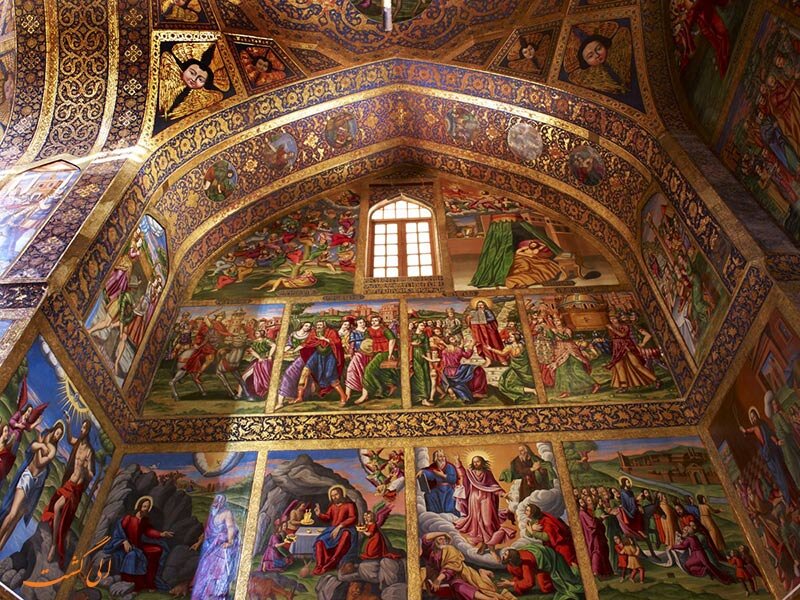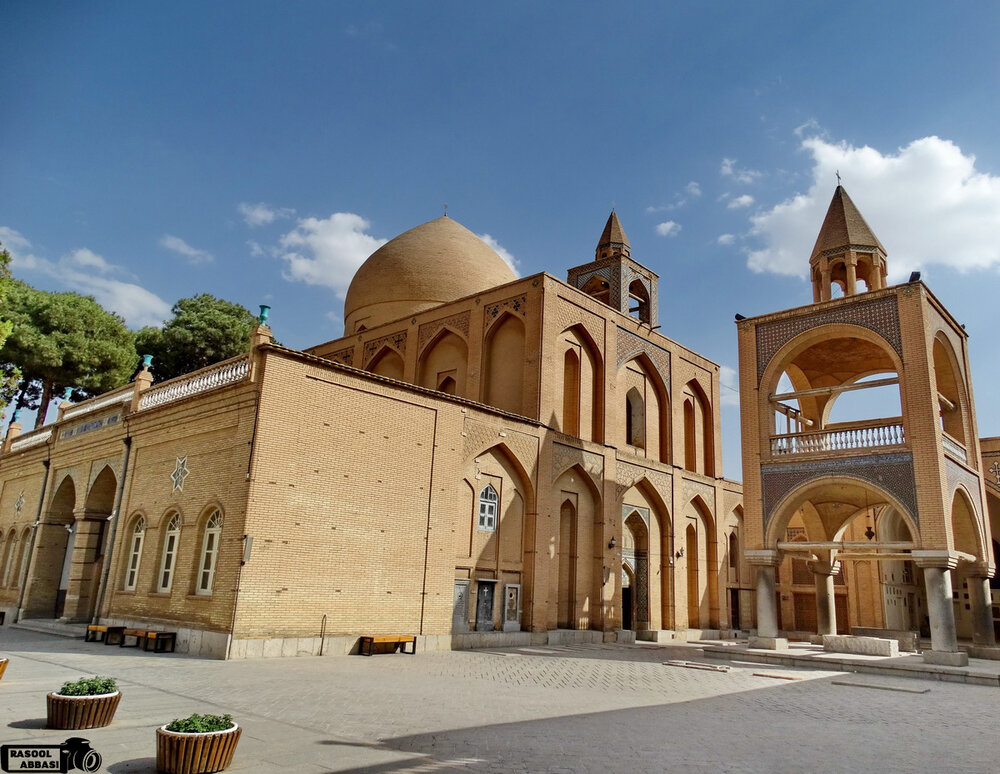TEHRAN – The centuries-old Vank Cathedral (locally called Kelisa-ye Vank) is widely referred to as an everlasting masterpiece of architecture.
Located in New Jolfa district of Isfahan, central Iran, the Cathedral harmoniously blends Islamic motifs and elements with those of Armenians. Vank means “monastery” or “convent” in the Armenian language.
Built in the first half of the 17th century, with the encouragement of the Safavid rulers, Kelisa-ye Vank is a historic focal point of the Armenian Church in Iran.
The cathedral consists of a domed sanctuary, much like an Iranian mosque, but with the significant addition of a semi-octagonal apse and raised chancel usually seen in western churches.
Its sumptuous interior is richly ornamented with restored wall paintings full of life and color, including gruesome martyrdoms and pantomime demons. The ceiling above the entrance is painted with delicate floral motifs in the style of Persian miniature.
The cathedral’s exteriors are in relatively modern brickwork and are exceptionally plain compared to its elaborately decorated interior.
There is also a museum exhibiting a fabulous collection of illustrated gospels and Bibles, some dating back as far as the 10th century.
Hundreds of Armenians, who migrated to Isfahan during Ottoman–Safavid War (1603–18), contributed to the cathedral being completed.

Some say that the varying fortunes and independence of this suburb across the Zayande River and its eclectic mix of European missionaries, mercenaries and travelers can be traced almost chronologically in the cathedral’s combination of building styles and contrasts in its external and internal architectural treatment.
The construction is said to begin in 1606 by the first arrivals being completed with major alterations to design between 1655 and 1664 under the supervision of Archbishop David.
The Armenian quarter of Isfahan dates from the time of Shah Abbas I, who transported a colony of Christians from the town of Jolfa (now on Iran’s northern border) en masse, and named the village ‘New Jolfa’. Shah Abbas sought their skills as merchants, entrepreneurs and artists and he ensured that their religious freedom was respected – albeit at a distance from the city’s Islamic center. At one time over 42,000 Armenian Christians reportedly lived here.
Many visitors visit the cathedral in the afternoon and stay on in New Jolfa to enjoy dinner in the relatively liberal village atmosphere.
Isfahan is Iran’s top tourist destination for good reasons. Its profusion of tree-lined boulevards, Persian gardens and important Islamic buildings gives it a visual appeal unmatched by any other Iranian city, and the many artisans working here underpin its reputation as a living museum of traditional culture.
Here is a select of comments that visitors to the cathedral have posted to TripAdvisor, one of the most popular travel websites in the world:
"Beautiful piece of history"
A not-to-be-missed visit in Isfahan. A beautiful piece of art and a nice museum. Useful to understand the construction of the city and yet another part of Armenian history in the world. (Sibtravelling form Brussels, Belgium; reviewed April 2019)
“Change from the mosques”
This cathedral is in the Armenian quarter of the city next door to the Armenian museum. It’s small for a cathedral but has some interesting art work and visiting the museum afterwards rounds out the backstory of Armenian migration to Iran. (Casa62 from Brisbane, Australia; reviewed April 2019)
“Worth your time”
Fabulous settings and artworks, museum not really inspiring. Though there are great funky coffee shops in the area. Suggest you take a stroll along the river. (Casanovawinner19 from London; reviewed April 2019)
“I expected more”
Armenian cathedral in Isfahan. I didn’t expect there is payment for visiting this holy place. Entrance fee is 50 000 toman. (Edin Krnic from Podgorica, Montenegro; reviewed May 2019)
"The awesome Armenian Cathedral of Isfahan!"
From its simple brick walls, one cannot imagine the beauty of its interior: a domed ceiling, several frescoes, gilded carvings and rich tileworks. On its courtyard, a bell tower, several graves, a stone cross, a library, a museum and a memorial to the 1915 Armenian Genocide. Combine your visit with lunch or snacks at any of the several cafés and restaurant of nearby “Jolfa Square”. Enjoy! (LuizDutraNeto from Rio de Janeiro, Brazil; reviewed February 19, 2019)


No comments:
Post a Comment